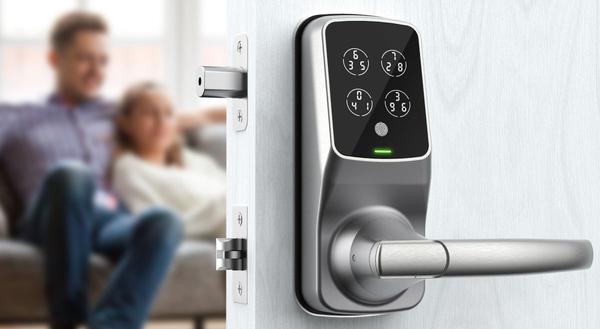Kwikset new Halo and Aura smart locks have both made it easier to control them through mobile apps.
The Wi-Fi-powered Halo lock skips past traditional low-power wireless standards like Z-Wave, Bluetooth LE or Zigbee. It connects straight to the internet with no bridging hardware. The Bluetooth-only Aura lock has no bridging element and only lets you control it from an app when you're in Bluetooth range.
Both approaches have their limitations, but at least theyre easy for consumers to understand.
The challenge for the Halo will be battery life. Wi-Fi connectivity requires more power than other networking standards. Bluetooth-powered August Smart Locks claim a year of power from four AA batteries. In three years or so as an August lock owner, I've found that claim an accurate one. Kwikset estimates six to twelve months from four AA batteries, depending on usage. If six is more common, that feels like more battery swapping than most people would want to deal with.
Halo's other features satisfy most of my expectations for a modern smart lock. It has options for either physical keypad or digital touchscreen keypad for access control, along with a traditional keyway for a physical key, and a standard array of bronze, chrome, and black finishes for the touchscreen model. Kwikset doesn't get specific about how Halo might work with other smart home products, but it describe in its press materials "a robust, diverse automation network with other smart home product and system providers to give Halo Smart Locks homeowners the ability to build a fully automated smart home."
Kwikset could be more specific here. For an idea, Kwikset's Premis smart lock works with Apple HomeKit, and its Kevo work with Ring and Nest devices, as well as the IFTTT ("If this than that") rule-making service that links smart home hardware together so you can make automations with other devices and services.

The Kwikset Halo keypad edition will sell for $199, and the touchscreen keypad version will go for $229 when they ship later this year.
Kwikset positions the Aura lock as a budget smart lock option. It will cost $150 when it ships this year, which nets you a Bluetooth-powered smart lock with only a local connection option. Kwikset doesn't mention that it will include a bridging accessory to connect the Aura from Bluetooth to Wi-Fi, as is common for other smart locks. There don't appear to be any options for integrating it with other smart home platforms.
The chief benefits of the Aura, then, are local control (via the Kwikset app when your phone is in range) and what Kwikset describes as a user-friendly app and simple installation. The appeal here seems less compromised than the Halo lock might be from its power-hungry Wi-Fi connection. I can imagine a lot of people might like the idea of a lock they can control with an app, but without the complications of deeper smart-home integration. The Aura seems to offer that.
It's even possible Kwikset might offer a Bluetooth-to-Wi-Fi bridge for the Aura at some point in the future, as it does with its Kevo locks. That would give an option for customers who are interested in a path toward an expanded feature set but won't overwhelm those who want to keep it simple. Ideally Kwikset would offer a bridge device when the Aura launches. It already has a bridge for Kevo.
All the cool new gadgets at CES 2019
See all photos+82 MoreCES 2019: Every story so far: See all of CNET's coverage of the year's biggest tech show.
CES 2019 schedule: It's six days of jam-packed events. Here's what to expect.








